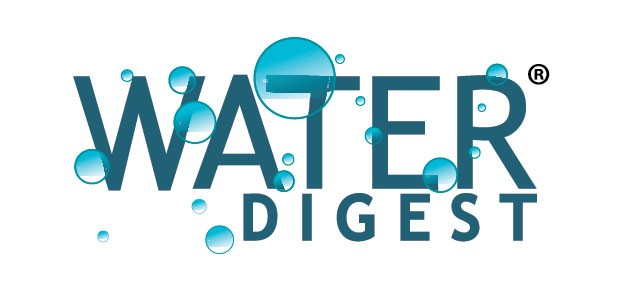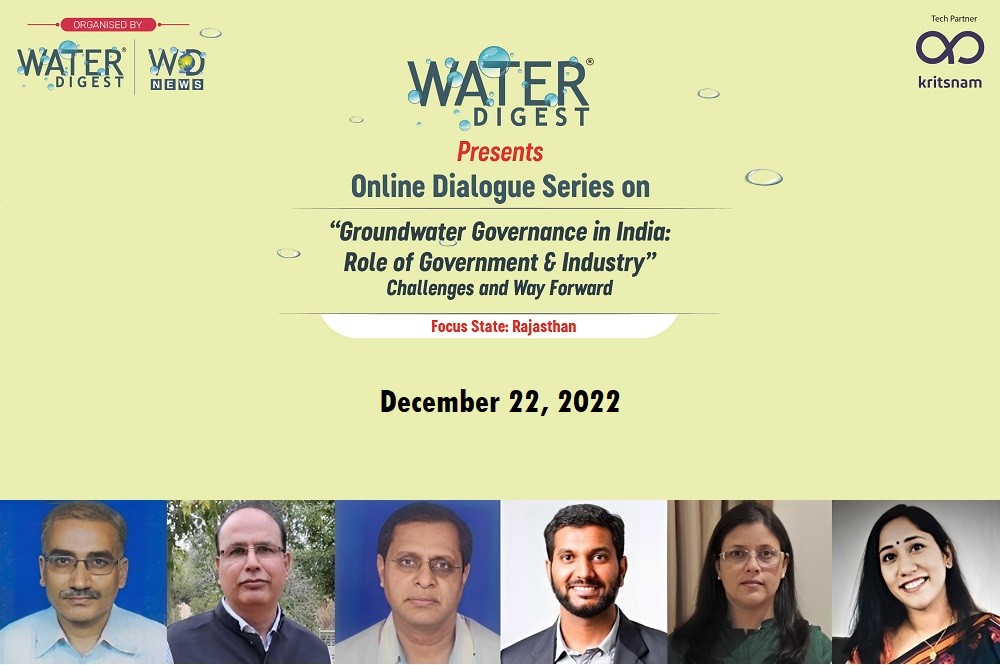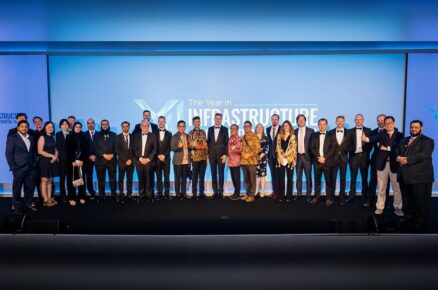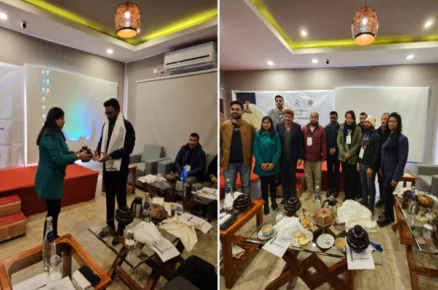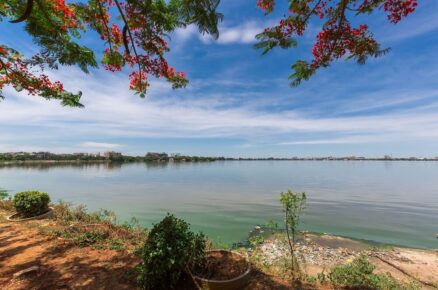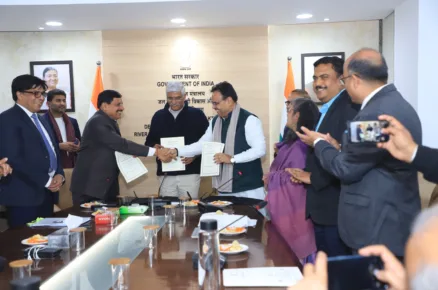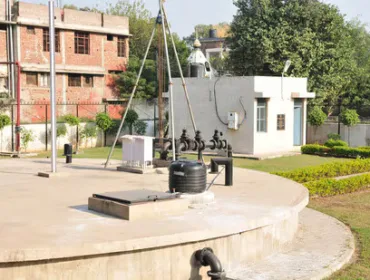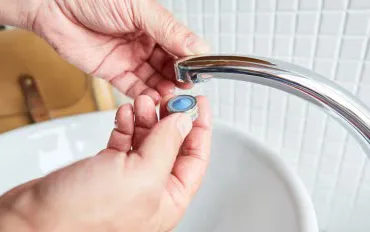WD News: Water Digest, in collaboration with Kritsnam Technologies Pvt. Ltd., organised the second edition of its online Water Dialogue Series on December 22, 2022 – to highlight and discuss the need for smart and sustainable groundwater management in industrial, commercial and agricultural sectors.
The focus state for this edition was Rajasthan.
- The idea of this series is to make every person value the role of sustainable groundwater in our natural hydrological cycle because, groundwater is the soul of our Earth.
- The series aims to cover significant areas like groundwater extraction regulations for industries, infrastructure and mining projects, challenges faced by groundwater users in taking NOC and fulfilling the criteria, adoption of new guidelines on groundwater, framing regulations applicable to specific states, need for conducting water audits and compliance, smart technologies for users & regulators for sustainable usage of groundwater, improving, monitoring and data evaluation, and what more to expect in future in terms of regulations.
Shri Pramod Kumar Tripathi, Regional Director, Central Ground Water Board – Jaipur gave the keynote address. He stated that as far as regulations are concerned, it is best for the industries to reuse greywater and treated wastewater coming from the Sewage Treatment Plants (STPs) to reduce dependence on groundwater. He added that even in the NOCs given by them there is a condition that in near future, the industry would reduce the use of groundwater by 20-30 percent with the help of latest technologies.
He said that currently we are giving NOCs but the challenge is ensuring the regular compliance and through such events and increasing awareness we are aiming for a better compliance. We have found, he added, that on the water supply side there is not much scope because of erratic rainfall and less run-off, our intention should be saving water on the demand side such as crop rotation and using drip irrigation and sprinklers in agriculture and applying water reuse methods in the industries. With the interventions on the demand side, behavioural changes happen and give long-term results.
He also shared the plans of doing groundwater assessments every year in the future. He highlighted the need of getting complete details of all blocks from the state officials (even village-wise, if possible) in preparing more effective groundwater assessment reports which would eventually help all the stakeholders.
This was followed by a Technical Session on Groundwater Governance in India: Role of Government & Industry (Focus State: Rajasthan).
Shri S.K. Pareek, Scientist-D, Central Ground Water Board, Western Region – Jaipur spoke in detail on ‘Groundwater Regulation and Control’, with a sharp focus on policy framework and statutory provisions of CGWA. Sharing the water profile of Rajasthan, he said that the stage of groundwater extraction has increased from 35.73 percent to 150.2 percent in the last 25 years. Groundwater is affected with fluoride, salinity, nitrate, and iron, etc (about 18 percent of total habitation is quality affected). While the number of over-exploited blocks has increased in the state from 203 (in 2020) to 219 (in 2022), the number of critical blocks has reduced from 23 to 22 and number of semi-critical block from 29 to 20 in the same period.
He further shared the water management options ranging from conservation/recharge, capacity building and participatory management to revival/rehabilitation and renovation. He explained it with an example that the rainwater accumulated in abandoned mine pits can be utilised for irrigation/domestic use. Similarly, saline water could be used for oil recovery, dyeing, and printing industries and for growing salt tolerant crops. He shared examples of textile industries using saline water in Balotra and using treated/recycled water in Bhilwara, thereby reducing fresh groundwater draft.
He, then proceeded to explain the background of Central Ground Water Authority, its power & functions, groundwater legislation, the applicability and salient features of guidelines along with latest status and general conditions for taking NOCs and exemptions for it. He said that they have received close to 18,000 applications so far and NOC/self-exemption is already taken by 4680 applicants.
Shri Vikram Singh Parihar, Chief Scientific Officer, Rajasthan State Pollution Control Board, in his address, explained the tasks and responsibilities of his organisation which are relevant to overall groundwater management efforts.
He shared his experiences of Water Conservation initiatives in Western Rajasthan, which reduce dependency on groundwater. His colleague, Mr. Abhishek explained the procedures for industries for obtaining the permissions for consent to establish and consent to operate with which Rajasthan State Pollution Control Board deals under the Water and Air Act.
The MSME sector is exempted from NOC for up to 10 KLD as per new guidelines but for service sector as well (hotels/hospitals), board has taken initiatives (such as the need to mandatorily install a sewage treatment plant in a hospital with more than 50 beds and reusing the water in gardens/plantation, etc. or for the need to build & operate an STP in buildings/group housing projects having water consumption more than 20 KLD.
Shri Vinay Chataraju, Co-Founder, Kritsnam Technologies shared the journey of his organisation and why, since its inception, it focussed on the issue of groundwater depletion. Supporting the point, he shared that as per a FICCI report, 83% industries have reported major risk of inadequate availability of water whereas 62% Indian businesses depend on groundwater source. He highlighted that India needs data-driven water management. Going ahead, he shared the important steps to be taken in this direction. The first step, he said, is to know your water footprint from all sources, the second is internal water budgeting, third is benchmarking with peers (water intensity ratio).
He proceeded to explain the featured and benefits and groundwater data collection instruments like Piezometer/DWLR (used to monitor depth of water level from the ground surface) and Digital Flow Meters (used to monitor quantum of water abstracted).
He explained the need of a data driven groundwater policy. He gave a detailed overview of Dhara Smart Ultrasonic Flow Meters and shared its mobile and web applications for easy data access, which can be used for industrial metering and industrial water monitoring.
Ms Sunita Mantri, Environmentalist, Activists & Chief Editor, Enkay Enviro Services shared the industry perspective with the attendees. She pointed out in the beginning itself that while she would be speaking about the industry’s perspective she would not be advocating the industrial point-of-view but would focus on the gap between the implementation and mindset of an industrialist or the project proponent. She remarked that it is important to understand the challenges of developing a groundwater governance framework for a specific region with extensive groundwater development versus relatively less-developed areas of groundwater development.
She agreed that it is a challenge to bring in the mandate of groundwater governance amid the development. While talking about the challenges, she said that the gap between society and science-technology is larger in the case of groundwater than surface water, societal acceptability of conservation of water is far from reality, effective and cost-sensitive water treatment technologies and treatment of industrial or domestic sewage are required, and realisation of authentic data of freshwater intake has to be voluntary among other points.
She concluded, that the way forward is having a tight grip on costing of water intensive units, guidelines for water audit for OE block units to be made regular and at frequent intervals, and ensuring the use of effective water gauges, flow meters and automatic data loggers, etc.
Ms Anupama Madhok Sud, Director & Editor, Water Digest, moderated the event and thanked the panel of eminent speakers and all the attendees for their participation.
She said that as there are a lot of good schemes being initiated and implemented by the government and activities like aquifer mapping are being done as far as groundwater management is concerned, it would be important to discuss the current scenario, best practices and policy guidelines in this regard, through such event platforms.
The participants shared their queries in a Question & Answer (Q&A) Session after the technical session which were answered by the panellists.
The queries ranged from the need of groundwater impact assessment studies for an industry based in a semi-critical area and extracting groundwater just below 100m3 per day; the steps to be taken for quality improvement of groundwater at a place where the groundwater is already polluted or saline and not useful for safe domestic or industrial consumption; the required procedure for an industry if its groundwater usage need has increased after getting the NOC.
The panel of speakers responded to all the queries and shared their expert views on the subject.
Click here to watch the complete session.
